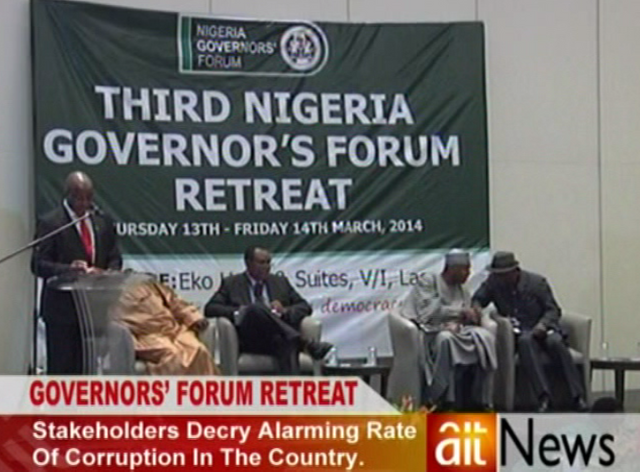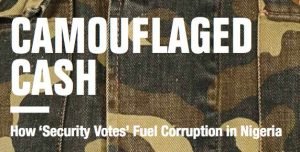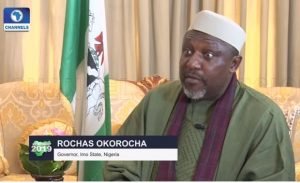
This is the fifth and last in the series of interpretive data on the question of how power might shape probity after the 2019 elections. Compiled within a MacArthur Foundation gaze on the ‘risk society’ implications of observably gargantuan level of corruption in Nigeria and administered by the Centre for Information Technology and Development, CITAD), the series started with “Power and Probity in Nigeria After 2019 Election”, (December 30th, 2018); “Social Influencers Reflect on Mainstreaming Probity in Nigeria”, (January 16th, 2019); “Power and Probity Profile of the February 16th, 2019 Presidential Election Candidates” (January 26th, 2019); “Power and Probity Profile of Senatorial Candidates in the February 16th, 2019 Election (1)” (February 4th, 2019) and “Power and Probity Profile of Senatorial Candidates in the February 16th, 2019 Election (2)” (February 6th, 2019).
All these have been uploaded on Intervention, thereby making them available on virtual space for different users of such details. In this edition, the focus is on governors who are to be elected on March 9th, 2019, situating the probity stance of the impending set on the probity features of the outgone set. That is, barring any postponement by the election management body – the Independent National Electoral Commission, (INEC).
There is a slight change in the focus of the narrative this time. Instead of case study based on some criteria, there is a thematic synthesis of recent media coverage of corruption related issues around and about governors in contemporary Nigeria. This doesn’t affect the substance of the project which is to establish a sense of the probity-power nexus based on what the referents have said and what others have also said on, about, for and against corruption. Such details will remain handy in the convoluted engagement with corruption in Nigeria. This focus has its main warrant in the homogeneity of governors as a layer of power in spite of geographical, cultural and party diversity in that layer. In fact, as the reader would observe while going through the synthesis below, there are instances where the governors took collective position on corruption related issues at the end of a meeting of the Nigerian Governors Forum, (NGF). Such instances give us an idea of the self-awareness in the politics of corruption in Nigeria which no other layer of power among those listed above has exhibited.
-

Barr Femi Falana, (SAN)The Falana thesis: According Femi Falana, a Senior Advocate of Nigeria, (SAN), only one state has an anti-corruption commission running and from which he infers that no state in Nigeria has been fighting corruption. The single state which has a functional anti-corruption commission happens to be Kano. According to the SAN, it is as a result of that situation that state governments are resisting payment of higher minimum wage “because they are not blocking the leakages going on”, (See “New Minimum Wage: Governors not fighting corruption– Femi Falana Laments, Daily Post, Jan 4th, 2019).
- General perception of governors to be wasteful and kleptocratic: There might be no better illustration of this than the view of the Nigeria Labour Congress, (NLC), the most established labour centre in Nigeria as far as aggregate view of workers is concerned. The NLC is on record to have called on workers not to vote for any governor in the then impending general elections who failed to pay the N30,000 minimum wage at the centre of a recent brawl with the government of the Federation. In the January 9th, 2019 story, “NLC: Don’t Vote for Governors Who Refuse to Pay New Minimum Wage”, ThisDay Live quoted Kabiru Ado Minjibir, the Chairman of the Kano State Branch of the NLC during a protest march to Government House, Kano as wondering why state governors could not pay the N30,000 minimum wage in view of their lavish expenses and extravagant government expenditures. Addressing a crowd described as mammoth by the newspaper and which he led to the Government House, Minjibir argued how realistic the proposed minimum wage of N30,000 particularly should state governors cut their expenses and block leakages.
- The Governor specific anti-corruption campaign in Nigeria: There is a sustained searchlight on governors as a collective held to be facilitative of corruption: For instance, President Buhari argued the media to expose corrupt governors, others during his joint appearance with the Vice- President, Yemi Osinbajo as guests of ‘The Candidates’ in the run-up to the 2009 presidential contest. (See The Guardian, Jan 17th, 2019). Much earlier on, the headline was “Pressure on CJ to probe ‘corrupt’ governors”, (The Nation, Dec 17th, 2018). Governors were mentioned among the president and the Vice-President, Senators and judges among public officials whose involvement in capital flight out of Nigeria the Human Environmental Development Agenda, (HEDA), felt justified the Chief Justice activating his powers to probe them, (governors). The CJN, argued HEDA in the story, is empowered by the Independent Corrupt Practices and Other Related Offences Commission (ICPC) Act to raise an independent counsel to probe allegations against the President, Vice President, governors and deputy governors. The story situated the position in the implication of serving governors in alleged diversion of the London-Paris Club refund effected by the Buhari administration. Additionally, it was also the time Governor Abdullahi Ganduje of Kano State was caught up in a controversy over alleged collection of bribes from a contractor.
- The London-Paris Club Palaver: There is a widespread belief that most, if not all the governors, kept aside this money for their re-election rather than for committing each tranche to serving their people. Why the perception persists is not clear but it tends to find corroboration in a particular case. The report “Eight Politicians With N232bn Corruption Cases Working for Buhari’s Re-election”, (The Punch, September 1st, 2018) detailed Governor Abdullahi Yari of Zamfara State’s battle with the Economic and Financial Crimes Commission, (EFCC) over alleged diversion of nearly N700m of the Paris Club refund due to his state. According to the report, his trouble began in 2017 when a Federal High Court in Abuja ordered an interim forfeiture of the sums of N500m and $500,000 (N180m) said to have been looted from the Paris Club refunds made by the Federal Government in favour of the 36 states of the federation. Still in the words of the newspaper, these sums of money said to have been recovered from two firms, First Generation Mortgage Bank Limited, and Gosh Projects Limited, were allegedly linked to the governor. To make matters worse, the EFCC swore to an affidavit in support of its ex parte application by which it sought the interim forfeiture of the said sums of money, alleging that the N500m was diverted to offset Yari’s personal loan obtained from the First Generation Mortgage Bank Limited.

Security vote as ‘camouflaged cash’: An emergent narrative of the strong link assumed to exist between governors and corruption is the one which holds the security vote to be the most fertile space governors explore and exploit. The most systematic engagement with this narrative must, arguably, be Camouflaged Cash: How ‘Security Vote’ Fuel Corruption in Nigeria, the 2018 publication by the Nigerian NGO, Civil Society Legislative Advocacy Centre, (CISLAC). How well the publication located itself in the reasons for a constitutional provision for ‘Security Vote’ by the right wing but ideologically informed Constitution Drafting Committee, (CDC) in Nigeria of the mid-1970s or how much note it took of the exigencies of running government in present day Nigeria are open to question but the title says a lot. This is with particular reference to the sums of money that the ‘Security Vote’ has grown into, contrary to the modest fall back for governors as they negotiate their way through questions of who is securing whom from what.- Sensational cases of alleged gubernatorial grab: It is doubtful if any other recent case can beat that of Governor Abdullahi Ganduje of Kano State in this regard. The video visual published by Daily Nigerian gave this allegation a flavour different from other corruption allegations. The image of a governor collecting and utilizing the pockets of his big gown, aka ‘babanriga’ to hide proceeds of alleged corruption was too powerful to go away too quickly. Although the question of proof has become dependent on who is speaking, it remains such a memorable case in recent time, especially as the governor has not been able to go outside politics rather than a transparent investigation of the entire claim.
- The collective argument of the governors on the charge of corruption against them: Governors have a central argument which is the belief among them that it is not because they are corrupt in their ways that they cannot pay salaries but that they do not have enough funds as a layer of power. Although this argument was advanced in relation to their indisposition to recent higher minimum wage negotiations, it is also beyond that specificity since they also demanded examination of national income for the past 14 years to enable them reach middle ground on minimum wage implementation. That is to suggest that their position would be borne out by history and that a structural problem is being explained away in terms of the narrative of corruption. On that basis, they stood on the position that they were not elected just to pay salaries but to also provide infrastructure, resources for which they argue they structurally do not have and that they could not perform magic, (See “Anti-corruption fight must follow due process, says 36 governors”, (Per Second News, August 16th, 2018). The question would be whether Nigeria has data to prove that claim wrong. That should conclusively put to rest the question of whether or not governors constitute a unique dimension on corruption as a layer of power in Nigeria.
- Individualized cases of fighting back: There are interesting instances when a particular governor fights back against allegations of corruption against him or her. Governor Samuel Ortom of Benue State is most unlikely to be beaten by any other governor in this regard. Asked by Premium Times (See “EXCLUSIVE: Gov. Ortom accuses Oshiomhole, Akume of corruption; tackles Buhari on ‘bad eggs’ comment”, August 27th, 2018) if he was denying being a thief as alleged by Abuja, Ortom unleashed a rhetorical blitzkrieg that must be quoted in full: How can I be a thief? I don’t need to be a thief to survive. I wasn’t a thief before I became governor, why should I be one when am getting older? I’m 57. Why should I be a thief at 57? There is no point”. As if the question provoked him, he declared how much of his own man he was before becoming a governor and how, aside from Aliko Dangote, he is the only person providing jobs to more than 1000 people as an industrialist and one of the biggest farmers, especially during cropping and harvesting period. “So, why do I need to be a thief? God has made me before I became governor”, he concluded. When the journalists turned the same question around by asking his opinion on the allegation that he is a practitioner of sharing the money, he went on the naked offensive, wondering why Adams Oshiomhole never made that allegation when he was a member of the APC. “What is the meaning of that? If you talk about sharing money, can Adams Oshiomhole give account? You are aware that one of his kinsmen is it reverend or bishop from his state took him to court to account for the N10 billion house he built. Where is the one I have here, in Abuja or anywhere? Where he is living in Abuja, where did he get the money?” Not one to speak for long without turning to the Holy Bible to replenish his wisdom, Ortom referred his former party boss to the portion of The Beatitudes where the hypocritical attitude of seeing a speck in another person’s eye when one might actually have a log in his or her own eyes was condemned. The long and short of it is that, in certain instances, some of the governors deploy their verbal or cultural facilities to turn the heat on their accusers. In such instances, they manage to bring out the contradictions of the anti-corruption campaign but without necessarily absolving themselves of complicity in one dimension or another. In the case of Ortom, for instance, the questions hangs thick why he has not paid salaries for an entire year in a completely agrarian economy such as Benue State.

Governors as source of ‘home truth’ on corruption: Some of the governors have been the source of what can be argued to be home truth on the reality of corruption in Nigeria. One illustration of this might be Governor Rochas Okorocha’s assertion to the effect that no one in Nigeria survives on his or her salary. His argument in an interview on Channels Television goes as follows: “There is no man on earth …from A to Z, who would say he lives with the money you pay him monthly. The salary of governors is 750,000 naira a month. If you don’t have a second office and you want something to do, you must steal. Every political office holder who doesn’t have a second office must steal”. (See “Imo State Governor Rochas Okorocha Justifies Corruption In Public Offices In Nigeria!”, in com, May 30th, 2018). The expression “you want something to do is taken to mean a governor or an elected official who wants to achieve something. Similarly, the expression ‘second office’ is taken to mean a supplementary source of financial resources. If the assigned meanings are correct, it then stands to reason that Okorocha is contextualizing corruption in his own way rather than endorsing or justifying it and his claim might merit critical engagement with. Governor Abiola Ajimobi of Oyo State has posed a similar position, saying, in his own case, that every Nigerian is corrupt: Having repeated the claim in virtually the same language, (“Every Nigerian is Corrupt”, (Sunnewsonline, August 4th, 2016); “Virtually every Nigerians is corrupt”, (The Cable, August 4th, 2016) and “All Nigerians are corrupt”, (ThisDayLive, October 25th, 2016), it is taken as the discourse of corruption of a member of the family of governors in Nigeria although he sees corruption beyond the financial and inclusive of the attitudinal and the social.
There can be no one sense of this report across the board. Something must be amiss if it is ever so. But, no matter the binocular with which any reader looks at it, there are what such a reader can itemise as key features. Using such key features, he or she can confront the question of what the governors-probity nexus might look like between 2019 and 2023 in Nigeria, all plausible variables considered.
This question makes sense because, in this report, both the governors and those who criticize them on corruption have spoken and it is possible for the average reader to construct a jump-off point for the possibility of dealing a decisive blow on corruption in Nigeria.
Posted from my blog with SteemPress : https://intervention.ng/15282/